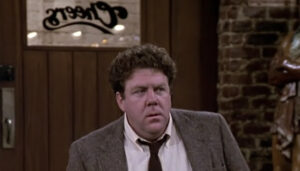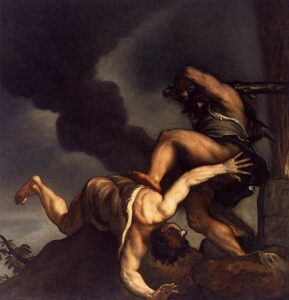
Imagine two friends, Steve and Fred, chatting at a New Year’s party. Both of them resolve to abstain from alcohol for January, and attend the gym regularly. They shake on it.
They don’t want to let each other down, and they both fulfill their commitments. Afterward, Steve keeps up his routine, and Fred soon drifts back to too much beer and not enough exercise.
Even though they accomplished the same thing, an astute third-party observer might have noticed a difference in how each man went about his goal. It was definitely hard for both of them; they both woke up at dawn, drank club soda while others were having a beer, and did lunges and squats until their muscles burned. For Fred this work felt like a battle against gravity (although a worthy one) and for Steve the change seemed strangely freeing.
Fred saw his efforts as the price he had to pay to get the reward he wanted. He wanted to look and feel better, so he had to pay for that, in the form of intense manual labor, boring drinks, and early-morning wakeups. Fred was just as disciplined as Steve, doing all the agreed reps and sets, but he was always looking forward to the end of each workout, and felt deprived at the taste of club soda and lime.
Steve had a different attitude, and it led to a different experience of the whole thing. He didn’t see the lunges and club sodas and early mornings as constraints imposed on him by the agreement, but rather as a way of living that was always available to him, which he was now adopting voluntarily. He didn’t groan about leg day, or tell himself that he “can’t” have a beer right now. He knew he wasn’t actually bound to those sacrifices, but rather he was choosing them because they’re better. He didn’t have to fight with himself about how much effort was “good enough”, because he saw that the reward and the sacrifice are inextricable. If he wanted one, he must want the other, because they only ever showed up as one thing.
Driving With the Brakes On
When I read East of Eden by John Steinbeck a few years ago, there was one scene that seemed to be centerpiece of the book, just by the way it was written, although I didn’t get the point at the time. The characters were having tea while dissecting Bible passages. That not being an area of interest for me, I kind of glazed over.
Now I see it as a careful unpacking of one of the most useful insights our species ever had about effort and doing.
(If mention of the Bible makes you tired or bored, bear with me for a minute; it might just save you a huge amount of trouble.)
East of Eden (and also the above story of Steve and Fred) is a retelling of Cain and Abel, the two Biblical brothers who illustrate two different approaches to effort and sacrifice. In Steinbeck’s book, Cain and Abel are represented by two California farmers, brothers named Charles and Adam.
I always thought the Cain and Abel lesson was pretty basic: there was a lazy brother and a hardworking brother. You should be the hardworking brother, or else you miss out on the deeper rewards of life, and then you become resentful and treacherous.
The difference between them is more subtle than that though. Both brothers worked hard, and both understood that doing so was necessary to access a better life. But Abel (or Steve, or Adam) makes his sacrifices wholeheartedly, without complaint. Cain gets mad at God immediately when his sacrifices don’t pay off, revealing that he resents the work but covets the pay. Like many of us, he regards the reward and its price as separate things; the work is an obstacle to the thing he values, rather than part of it.
This more subtle interpretation resonated with me, whereas the basic admonishment to “just do it” never did anything for me. I realized I tend to take the Cain approach. I’m always trying to sacrifice just enough to get the reward, and I get mad at the world, or how things “are,” when that doesn’t work. I’m always holding something back, as though God might rip me off, so to speak, if I accidentally overpay.
Reading the Bible story again, it struck me that I really am Cain. I’ve mostly been doing the Cain thing on this earth, wondering why it’s never quite enough. Imagine the goosebumps when I remembered that Cain is literally my name. David Cain — beloved king and treacherous brother.
Sometimes you stumble across the better way, if only because the other way just never works. I don’t think anyone sustains a gym regimen, or anything similar, if they’re motivated only by the future rewards. Everybody who keeps at it past January resolution season finds something about the toil itself to embrace. It might be the “burn,” or the “pump,” or some other synergy between exertion and gratification. It might be the reassuring sense of self-discipline. It might be that they like who they are when they’re doing it. But it’s got to be something, because embracing the reward while resenting the price just isn’t a viable way to go about something for long. You’re always in inner conflict. You’re driving with the brakes on.
In that famous East of Eden scene, one of the characters shares a discovery about how not to drive with the brakes on. Lee, Adam’s servant, has been studying the Cain and Abel story closely, down to each word, in various translations. He says that in English versions, Cain is told some form of, “Thou shalt rule over sin” — in other words, you must, or you will, do the right thing. You have to.
This is a command, of the kind we give ourselves when we resolve to work out three days a week, stop eating junk food, or go to bed at 10 o’clock. You will do this thing, you! That’s how it’s going to be! You hear me?!
Whether or not these sorts of admonishments do motivate you to act, it doesn’t really work out in the long run. Work done this way never frees you; it makes life feel like a kind of grinding between opposing forces. It isn’t a way you’d want to live, if you had the choice.
Essentially, Lee suggests that there is a choice. He tells the others that the original Hebrew word in the passage — timshel — doesn’t mean “you must” but rather, “you may.”
This changes the proposition entirely. God isn’t telling Cain what he must do, but what he may do. You may triumph over temptation. You may sacrifice wholeheartedly, without inner conflict. It’s not a command, it’s good news: you can be Cain or Abel. This possibility exists in every moment, and it’s the greatest gift we’ve inherited as humans.
For whatever reason, our man Steve got this on some level. He didn’t regard his workout regimen as an obstacle he had to get past to get a desirable thing in return. He saw it as an entire path, a way of living, that he could embrace or reject.
The new regimen seemed to him to be a better path than the one he was on, so he took it, and life — or God, if you prefer — showed him beyond doubt that he was right.
Timshel!
***
Images by Joyful, Zeeboid, Nicole Wilcox, Titian.




 I'm David, and Raptitude is a blog about getting better at being human -- things we can do to improve our lives today.
I'm David, and Raptitude is a blog about getting better at being human -- things we can do to improve our lives today.
{ 41 Comments }
This is another reason why the whole “diet” thing never made sense to me. Of course when you stop the diet the weight comes back … nor can spend your whole life under-nourished and miserable. You have to find a way of living sustainably and commit to doing it every day. You don’t get to just “be done” at some point.
Agreed. Something permanent in the character has to change. Although I do think we learn something just by doing something hard.
Bingo. You win the prize.
You must become a thin person in your head first then live a healthy body life comes naturally afterward.
All the thin people I know do NOT spend hours at the gym unless they want more muscle tone nor do they obsess over meals. They just live differently.
I didn’t drink alcohol in January as a birthday gift to my wife (her suggestion). She doesn’t drink. It was easier than I thought but today is Feb. 1 and I’m planning for a drink after work. So it looks like I’m a Cain. Your article has got me thinking about this, which is why I like your writings. thanks!
I mean, there’s nothing wrong with a nice premeditated drink. Enjoy!
David,
Great piece. Elsewhere, the Bible echoes the same sentiment with the phrase “Whatever you do, do wholeheartedly.”
I used to be a pack-a-day smoker. I started when I was 19 to prove something to myself. I quit when I was 27 but edged around the habit, smoking maybe once a month. Then I slipped into it for another three years between age 30 and 33, and finally quit again for good.
I once tried to explain to friends why it was so difficult to quit. For me, the line that described it best was a lyric from an old song by DC Talk, a then-famous christian rock band. It went: “Complexity haunts me, for I am two men, entrenched in a battle that I’ll never win”
I explained to people (and myself) that habits like smoking thrive in a divided soul. When you’re battling yourself, small compulsions take root in the no-man’s land between trenches.
The thing is, it took me a very long time to figure out how to close the gap–to eventually become of one mind about the topic, instead of two. And it’s not something you can do on a dime; it’s a long process of learning, and of convincing yourself. But one of the better formulations of the process was Allen Carr’s “The Easy Way to Stop Smoking.”
It was a brilliant little book, and almost the entirety of it is devoted to disentangling the smoker’s mindset. Smokers have trouble quitting because internally they have allied themselves with the buzz of smoking; they believe that they want to smoke, but want to be healthy more, and that’s why they quit — but that sets them up for failure because from the outset they have convinced themselves that they must spend a lifetime denying themselves something that they want multiple times per day for the sake of health.
His proposed alternative was to come around to the idea that you don’t want to smoke. If you choose to stop, and you still crave cigarettes, the problem isn’t that you want to smoke — it’s just that the cigarettes are producing residual cravings. You don’t have to give up something you want for a nebulous health benefit some day in the future — rather, from the moment you quit, life gets markedly better, and it just keeps improving, and any part of you that craves a cigarette is just a lie told to your body by a chemical.
Different people will describe the mindset shift different ways, but I remember reading that and I had one of my more successful attempts at quitting shortly after. It took another year or two before my first real success at age 27. My final success, at age 33, happened almost entirely by accident, but when it did, I recognized the opportunity and ran away from the habit because I realized that there was no part of me that wanted it, and whatever fondness I felt for it was deceptive.
And that’s how I came around to being Abel, I suppose. There’s a philosophical edge to my quitting; I can acknowledge now that I like smoking and that it feels (or, rather, felt) good. But it is a lesser joy, and I loved everything about myself and my life so much more once I gave it up that I have never felt an urge to return.
C
That wholeheartedness seems to be a major theme in the Bible. It seems like it’s trying to steer you away from the “One for my virtues, one for my vice” type of living, where you’re trying to hang on to some of the knowingly bad motivations, and embody enough of the good ones that you don’t have to sacrifice those things.
I’ve heard about Allen Carr’s book and people say it is unlike any other stop-smoking approach they’ve tried. It sounds like there’s some sort of identity shift that might be analogous to the kind of identity shift pointed at in spiritual texts.
David,
I highly recommend that you read Allen Carr’s book for no other reason than just to see what he does and how he does it.
Philosophically he seems more aligned with the Ne-Thought, power-of-positive-thinking movement. I was never comfortable with that sub-culture, but Carr is so earnest and does such a good job identifying and speaking to the fundamental divide that smokers face that he’s very effective. I’m not sure his book is quite as effective as some people make it out to be (statistics are hard to find), but even if it is only a fraction as effective, he has quite literally talked many thousands of people out of smoking.
J
David,
I forgot to mention this. I’d be remiss if I didn’t point out that the core of the New Testament Christian doctrine actually revisits the themes of Cain and Abel. In Christian theology it’s discussed as the difference between God’s grace and the Law.
The Law is like what you’ve described as the “Cain” mindset. People want to do bad things but also want to go to heaven so there’s this law they have to fight really hard to obey for their whole lives, and if they pull it off, they get the prize. Generally they don’t succeed.
Grace, on the other hand, is described as a transformation from the inside — an openness to changing on a fundamental level until every bit of you is in wholehearted alignment with the idea of being a whole, righteous person.
There’s a lot of disagreement over what “grace” means in the particulars (as the story goes, it was a key feature in Martin Luther’s transformation, and also underlies his break from the Catholic church). Also, Christians as a group rarely seem to embody grace all that well. But the themes are there, at least.
C
Ah, that makes so much sense. There’s a similar line emphasized in Buddhist practice, where ultimately you’ve got to let go of the rules and concepts that point you towards the ineffable/nameless/unborn (all the words for it are bad) and simply attend to that quality. Like the grace you describe, this is experienced as a fundamental change in identity and the end of the person as a separate entity battling with the world.
I had no interest in Christian theology until I was able to map my experiences with Buddhism onto what I was reading in the Bible. It’s clear that to some degree at least they’re referring to the same sort of transcendence.
David,
I was raised Christian and took it quite seriously in my youth. It shares overlap with Buddhism and any other religious faith — they all are concerned with divinity (in some sense of the word) and therefore they attract the full range of experiences associated with divinity, from those who view it as an overseer (the man-in-sky-with-thunderbolt crowd) to those whose experience is primarily mystical and transcendent. Most people outside of a faith make the mistake of assuming that a religion’s experience of divinity is expressed in its scriptures in a sort of rigid way — like what’s said in the book constrains how the people of that religion experience God. There’s some truth to that? But it’s more like a tether than a wall; Christian scriptures anchor their religious experience by providing a common point which they diverge from and use to communicate. But given that starting point, there’s a lot of variation.
If you’re interested in seeing an example of Christian mysticism that overlaps heavily with Buddhism I would recommend looking up the book ‘The Cloud of Unknowing’ — it’s an ancient text so finding a free translation online should be easy.
Also, looking into Chrsitian monastic history would also turn up some interesting parallels. For a long time there was a movement of people who left society and banded into monastic communes in search of a transcendent experience with God. St. John Cassian wrote an interesting book on managing monks; it was much less about the mystical experience and more about the logistics of dealing with a whole bunch of men who gathered in a desert monastery to meditate. But it was fun to read some of it. (I focused on his chapter on Acedia, for my research).
David,
Is that final shift — the discarding of the rules — enlightenment?
I often found the idea of enlightenment to be somewhat off-putting. Mostly because I wasn’t really sure what part of me it was that was supposed to end. I like most of me. I don’t want to give it up–even the mixed parts.
The way you phrase it, though, it’s certainly worth looking into more. If you have any books you could recommend I’ll be happy to look into them.
C
Some people call it enlightenment, but again that’s just a word. I highly recommend the book Awake by Angelo Dilullo. No mumbo jumbo, plain language, practical instruction. But also not boring.
As I was reading the article I realised that it crystalized my thoughts about self-help…
Many (but not all) self-help books are written along the format of “do this one thing conscientiously and you will achieve this goal”. Cain speak, and often written by people who have already achieved their behavioural goal. No wonder most self help books, and the activities they propose, fail.
Not only do that type of Cain speak books fail they set up the self-help seeker for future failures (“Tried it once, twice, didn’t work”).
So, on reflection, I realise that my own successes were because I wanted to achieve something for the being of my future self – and not through the desire to fulfil other peoples’ expectations.
My problem with most self-help is that the person did not acquire their exceptional abilities by doing the thing they say in the book. That might be part of it, but there’s a whole identity behind their success, and that can’t be transferred as information through a book.
Agreed. I don’t care much for a lot of the self-help genre, because it’s often written by people who don’t have the problems they’re advising others on, and the writers aren’t successful because they overcame their problems — they’re successful because of their book.
“Imagine the goosebumps when I remembered that Cain is literally my name.“ That really made me smile. Thanks for the interesting post.
David, I loved this piece. I laughed out loud and sighed throughout. I am a personal trainer and this makes me think of a handful of my clients. I love working with the Abels, but the Cains fight me the whole way.
Wow, I never stopped to notice the analogy of that story
One thing that is working for me lately, is seeing some ‘to-do’ things as challenges, this gamified vision greatly diminishes the feeling of burden that my mind usually generate when something need to be done and reward is not really visible in the near horizon.
I’m not sure, but I guess this subject fits with I am facing right now, I’m learning a third language, so, it’s totally voluntary, there is no external pressure, thus, there is no social reason to I be oblied to learn it in a unpleasant way. Also, I’m reviewing learning languages techniques philosophy itself: One major (and efficient) learning paradigm called Comprehensible Input, suggests that instead of oblying ourselves to face practices that we don’t like and we push ourselves (e.g usually exercises grammars) – Cain perspective – we better look for, still a practice, but that we can do in a unnoticed flow (feel rewarded as we are doing), not as a necessary burden (not feel rewarded now, only in the future) – Abel perspective, or also, my personal addition to the saying: still face that boring practice, but before, see it as personal challenge instead of to-do task.
Great essay, David! I’m thinking about my approach to some things I need to do: am I going at them Cain-style or Abel-style? And I’ve sent it to my son. I think he might get help from it with his approach to a difficult change he is making in his life.
A friend of mine told me that she finally succeeded in quitting smoking when she shifted her goal from “I want to stop smoking” to “I want to be a non-smoker.” I now see that the same shift of perspective is probably what lay behind that simple formulation.
I can see how transcending the Cain/Abel divide must amount to an identity shift of some kind, rather than a “behavior change,” which implies that the person doesn’t change, only what they do changes. A smoker who doesn’t smoke is not a happy person.
Same with the Ten Commandments: you can read them as Ten Promises. That is: you will be happy in this life and in the after-life when you will: [fill in the blanks with the commandments]. Very freeing.
This is also how we can understand the buddhist concept of ‘karma’: it’s literally pointing to the Law Of Cause And Effect. So you don’t even need a god for the reward: causality alone makes things work.
Yes, exactly. If instead of “laws you must follow” they’re interpreted as “laws of how the universe works,” suddenly it’s a matter of recognizing that the world works this way, and acting accordingly, which is intuitive, rather than a matter of making yourself act according to a behavioral standard, which is unintuitive.
I’m retired….I now work more and with a greater intensity than ever before.
Primarily, I do this simply because I like working. I’m fortunate in that I work in areas that I love working in.
Music & art, real estate, and oh yeah,
Maintenance!
There’s birth, and there’s death, and in between….There’s Maintenance!!
Maintenance of everything in your life up to and including your body.
I do all this with a smile on my face, simply because I enjoy it
Thanks David for another brilliant piece of work!!
One of the biggest insights I’ve had in a long time, and it only recently became obvious on the conceptual level, was that even though something in me resists working and wants to avoid it, I like the feeling of working much more than the feeling of not working. I like fixing things, cleaning things, doing things, even though I spend so much energy trying to avoid getting around to those tasks for some reason.
This is so me! A great day’s work gives immense satisfaction and peace to me but I would put million defenses to start doing the work! I love when I go in the state of flow but to reach that point is pure struggle with the mind. I am yet to figure out how to minimize this “activation” phase and get on with it without hours of self talk, motivation and pushing myself!
I just re-read East of Eden last year, and it’s funny that my teen interpretation vs. my middle age understanding of that part of the book is so different. Teen Liz was really rooting for the Abel character, really wanted to embody that type of “goodness”. But Older Liz realized she was more of a Cain, and that was okay because you got to learn something along the way.
That’s interesting. I bet I’d have a similar experience rereading it. I saw myself in Adam because I liked him more, and I barely remember the parts with Charles. But I’m sure I had a lot more to learn from Charles.
Great essay! I’ve had a copy of East of Eden sitting on my shelf for a while now. This inspired to pick it up.
Oh man it’s so good. Top 5 for me.
I have always felt that the reason why humans are different from every other creature on earth is because we have the gift of choice. A rabbit cannot choose to be an ant and a weed cannot choose to be a rose. But we can choose to become anything. That’s what makes us so beautiful as well as dangerous.
It’s true that we fight ourselves when we must choose between pleasure and discomfort…and that’s why so many of our good choices fail. It all begins in what we are thinking about because where the mind goes, the man follows.
As I understand it this is the central point of the Bible. Adam and Eve ate the fruit, and were blessed/curse with knowledge of good and evil. They were cast out of Eden, which is the realm of animals, and their descendents (us) are still trying to learn to use this gift of choice, but we keep failing again and again. There are glimmers of enlightenment throughout every human life, and ultimately we’re destined to succeed, but for now we are in the trenches, fighting with ourselves inwardly and outwardly.
I found the ‘timshel’ part of the book so powerful that I almost got it as my first tattoo (after having thought about getting one for 10 years but never finding sth where I was sure I’d want it till death). Then I did some internet research and apparently that translation is not really what hebrew scholars agree upon? So I didn’t get it tattooed, but correct translation or not, it remains a favourite lesson that I think back to ever so often. Thanks for reminding me :)
Great observation and reflection. And a reminder that the power to choose is not equally distributed. Back in 2016 I read this post (link below) and since I have guarded it as a constant reminder that I get to do stuff rather than have to do it.
https://tinybuddha.com/blog/3-words-that-will-change-your-entire-life-if-you-let-them/
Oh, this is my alternate description of choosing a different life script. So well articulated by David and the related comments.
Think I am likely a Cain by default.
Managed nico cessation after over 50 years of engaging with the Abel model.
I laughed quite long at your name realization!
That is just hilarious! LOL
I have 100% been Cain for most of my life BUT I now realize, especially after reading another insightful article from you, that I have turned a corner and am “enjoying the journey” so they say.
I agree with Steve…It IS freeing.
Hi David,
I read East of Eden many, many years ago and I have never forgotten that passage!
Thou mayest! We have choices and we can make them freely and, as others have pointed out, wholeheartedly.
Thanks for another wonderful post!
Good idea.
Small correction: it’s not timshEl but TimshAl תִּמְשׇׁל and the translation to Hebrew is “You WILL rule [it]”. However most Bible translators agree that even though the literal meaning is you will rule your urge, “God” (or whoever wrote the book) means to say that you may rule it, if you wish.
Thank you David for writing these authentic blog posts over the years. Ever since I found Raptitude, I’ve always come back for more. In fact, I take this blog as an inspiration when I’m writing articles on mine.
I hope this blog never goes away.
Great post. I chose motherhood thinking about the feelings of having an adult son or daughter to share good moments with, but knew raising a young child would not be pleasant for me. I was right. My struggle turned out to be specially hard, with a disabled child, and the reward I was looking for no longer seems attractive enough in exchange for the years of hard work. Funny thing, I’m above average at parenting. Waaay above average . But I can’t wait for the nest to be empty. and since I don’t really have an option, I wonder how I could get out of the Cain mode in something I’ve always known I’m not cut out to enjoy even if I am good at it.
Thank you for this thought-provoking article! The story of Steve and Fred perfectly illustrates the difference between approaching challenges with resentment and embracing them as opportunities for growth.
The concept of “timshel” – “you may” – is a powerful one. It reminds us that we always have the choice to choose the path of least resistance, like Cain, or to embrace the challenge and find fulfillment within the effort, like Steve.
I appreciate the reminder that true transformation comes not from sacrificing for a distant reward, but from finding joy in the journey itself. This is a valuable lesson I’ll carry with me.